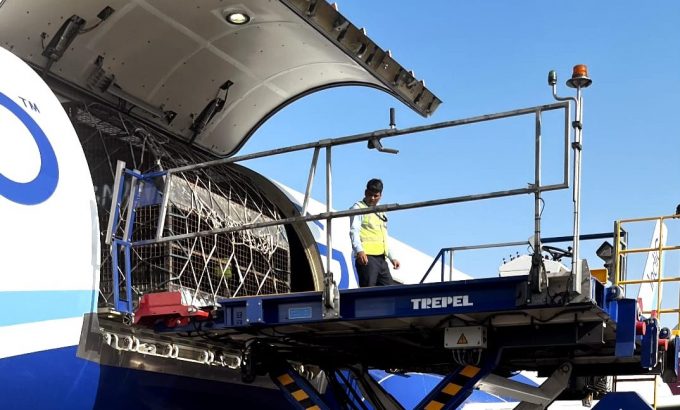Magma expands to Dubai with two freighters, as ASG keeps growing
Magma Aviation, the Avia Solutions Group-owned airline, has expanded with a new base and two ...
TFII: SOLID AS USUALMAERSK: WEAKENINGF: FALLING OFF A CLIFFAAPL: 'BOTTLENECK IN MAINLAND CHINA'AAPL: CHINA TRENDSDHL: GROWTH CAPEXR: ANOTHER SOLID DELIVERYMFT: HERE COMES THE FALLDSV: LOOK AT SCHENKER PERFORMANCEUPS: A WAVE OF DOWNGRADES DSV: BARGAIN BINKNX: EARNINGS OUTODFL: RISING AND FALLING AND THEN RISING
TFII: SOLID AS USUALMAERSK: WEAKENINGF: FALLING OFF A CLIFFAAPL: 'BOTTLENECK IN MAINLAND CHINA'AAPL: CHINA TRENDSDHL: GROWTH CAPEXR: ANOTHER SOLID DELIVERYMFT: HERE COMES THE FALLDSV: LOOK AT SCHENKER PERFORMANCEUPS: A WAVE OF DOWNGRADES DSV: BARGAIN BINKNX: EARNINGS OUTODFL: RISING AND FALLING AND THEN RISING

IndiGo, India’s largest private airline, sees cargo as a strong growth tool as the market expands and government reform measures to tighten logistics costs take greater hold.
“The air cargo industry in India is regarded as a thriving and competitive market that presents a promising opportunity for investment and growth,” Mark Sutch, CCO of the carrier’s cargo arm, CarGo International, told The Loadstar.
“During the pandemic, the demand for cargo movement in India went significantly high, and this trend is expected to continue in the foreseeable future,” he said.
IndiGo, which recently added a third freighter – a converted A321 – to its fleet, believes a sizeable reduction in logistics costs, which now stand at some 13% to 14% of India’s GDP, would substantially boost export trade.
“E-commerce growth has had a significant impact on the air freight shipping industry, and the demand for fast and reliable delivery of products has increased due to online shopping,” Mr Sutch said.
According to him, Indian air cargo stakeholders have positioned themselves to deal with evolving logistics challenges and capitalise on the opportunity. To that end, Mr Sutch said, India’s freighter fleet size was set to expand dramatically, from some 15 aircraft at present to 80 by 2041, according to industry projections.
As regards commercial and operational strategies, the CarGo chief said the airline had seen transit cargo demand grow in the Far East, prompting it to open more connections between India and the UAE.
“With regional competitors, we compete on frequency and service as well as leverage our significant domestic India reach,” said ex-Cathay Cargo executive Mr Sutch, who joined IndiGo a year ago, after a brief stint at CMA CGM Air Cargo.
“But competitors can also be partners,” he added.
Thanks to a better product mix profile and rising volumes, CarGo had remained profitable, Mr Sutch said.
“Overall, we transport around 30,000 tonnes of cargo each month and our revenue is growing by 10%, on a year-on-year basis.”
IndiGo is also devising strategies to ramp up flight frequencies and destinations, with a goal to double freighter fleet utilisation to some nine hours a day.
Mr Sutch added: “To maximise our freighter operations in 2024, we are tailoring our services to cater to specific cargo needs, such as e-commerce, perishables and time-sensitive items.”
The airline has also prioritised tier 1 and tier 2 locations in India for its air cargo network expansion, while continuing to explore the potential for additional connectivity to China and South-east Asia.
Besides putting a heavier focus on tech advancements, IndiGo is looking at industry-level collaborations to boost its market share. That growth push is already reflected in its latest earnings report, as group net profits for Q3 (October-December) of fiscal year 2023-24 swelled 111% year on year, to some $360m.
“With five consecutive quarters of profit, we continue to recover from the losses of Covid and have now become net worth positive again,” said CEO Pieter Elbers.
IndiGo is due to receive a fourth freighter of the same converted model some time this year. And significant additional belly capacity is on the way, as the carrier last year inked an ambitious deal with Airbus to acquire 500 more aircraft, on top of some 480 aircraft already on order with the French manufacturer, with deliveries scheduled between 2020 and 2025.
You can reach the writer at [email protected].
Comment on this article